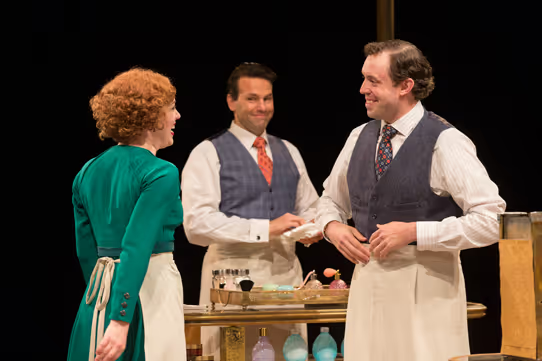She Loves Me
★★★★
Chicagoland theater does not currently lack for large scale musicals. Consider such spectacles as “Aladdin,” “Jesus Christ Superstar,” “Chicago,” and “Mary Poppins.” But for playgoers who want to dial down the intensity level in favor of a musical that rides on warmth, charm, and honest humor, “She Love Me” awaits at the Marriott Theatre.
“She Loves Me” has a long pedigree. It began as a Hungarian play in 1937. The play was adapted into the popular romantic motion picture “The Shop Around the Corner” in 1940, starring Jimmy Stewart. A musical version called “In the Good Old Summertime” starring Judy Garland was released in 1949 and an updated movie adaptation called “You’ve Got Mail” was a hit in 1998 with Tom Hanks and Meg Ryan. “She Loves Me” hit the Broadway stage in 1963 with music by Jerry Bock and lyrics by Sheldon Harnick, both of “Fiddler on the Roof” fame. Joe Masteroff (“Cabaret”) wrote the delightful and often humorous book.
The Broadway show received respectful reviews but never achieved hit status and is seldom revived. So discriminating playgoers had best seize their moment by attending the superb Marriott Theatre production. Like another gem of a revival, “The Most Happy Fella” at Theo Ubique, “She Loves Me” is one of those works that can encourage viewers to wonder why the show hasn’t been staged more often when we seem to get another “The King and I” presentation annually.
Like the original play, “She Loves Me” is set in Hungary, obviously Budapest, during the 1930’s. The location is a toiletries shop where female customers come to purchase perfumes, lotions, creams and other beauty enhancement products. The time coincides with the Great Depression and rise of fascism in Europe, but the musical lives comfortably in its own cocoon of innocence.
The central characters are a pair of appealing shop employees, clerk Amalia Balish (Elizabeth Telford) and manager Georg Nowack (Alex Goodrich). In the shop, the pair seems incompatible, constantly bickering and insulting each other. But both are actually lonely and desperately seeking love in their lives. Each writes letters to a “Dear Friend,” fantasizing a love affair but not realizing that they are actually writing to each other, without using their real names. The couple churns through the usual misunderstanding until they reach the inevitable upbeat conclusion both so honorably deserve.
“She Loves Me” is a small-scale show with most of the action limited to the interior of the shop. There are about two dozen songs in the score but they are all narrative-driven and don’t hold up that well taken out of context. But each one fits its moment neatly, whether it’s comic, wistful, dramatic, or yearning. The title song is the only familiar stand-alone tune of the evening; with Georg ecstatically declaiming that Amalia actually loves him. Most of the singing comes in solos and duets. No chorus belts out ensemble numbers and there isn’t much dancing, though what there is does great credit to director/choreographer Aaron Thielen, especially a highly stylized group number presented by uppity customers at a toney Budapest restaurant.
Amalia and Georg are the heartbeat of the storyline, but a handful of splendidly-acted complementary characters make valuable contributions. Mr. Maraczek (Terry Hamilton) is the owner of the shop who fears someone on his payroll is having it on with his wife. Ilona Ritter (Jessica Naimy) is a highly sexed and gullible clerk given the run-around by Steven Kodaly (David Schlumpf), another clerk and a real slime ball lady’s man. Ladislav Sipos (James Earl Jones II) is a clerk trying to conceal his mediocrity so he can keep his job. Arpad Laszlo (the role is split between Grant Killian and Johnny Rabe) is the shop’s teenage delivery boy who aspires mightily to reach the promised land of a full clerkship. All the supporting characters wind up with their own happy endings, except the rotter Kodaly who gets a well-earned heave-ho.
Telford and Goodrich play off each other wonderfully, Telford’s Amalia is warm and outgoing and wearing her heart on her sleeve. Goodrich’s Georg is more reserved on the outside but emotionally aching on the inside. Each time I’ve seen him in a local theater, Goodrich never failed to hit the bull’s-eye, whether it’s in Shakespeare or a musical. The production is a coming out party for Jones as a musical comedy star. He has already established himself as a solid dramatic actor but at the Marriott he turns Sipos into a superb comic character, full of drollery and perfect timing. A theater needs to find a starring comic role for him.
Another scene-stealer in a smallish role is Steven Strafford as the headwaiter at the ritzy restaurant. Strafford gives an Eric Blore-type comic performance, dominating the long restaurant scene at the end of the first act with his flustered hauteur and pomposity, a humorous gem of a cameo. The cast goes deep in veteran proven talent with the ensemble populated by feature players like Lillian Castillo, Allison Sill, Johanna McKenzie Miller, James Rank, and Laura Savage.
At first Jeffrey Kmiec’s set looked a little cramped within the Marriott in-the-round performing space, but Thielen has deftly used the stage, the aisles, and the edges of the stage to capitalize on the interior’s intimacy. There are 18 people in the cast (though not on stage at the same time) but the action never looks cramped. Sally Dolembo’s costumes capture the period character of the story, atmospherically supplemented by Robert Gilmartin’s sound design and Jesse Klug’s lighting. And Sally Weiss’s properties add jut the right sense of place, whether the story is in the shop, a hospital room, or Amalia’s bedroom. The theater orchestra sounded especially good, nimbly performing arrangements of more than average musical variety.
Charm can be a wishy-washy adjective to describe a play, but it fits “She Loves Me” without suggesting cloying sentimentality. The patrons on opening night virtually cheered Amalia and Georg as they went into a clinch upon discovering they were each other’s Dear Friend rather than shop adversaries. The final blackout drew sighs of approval and pleasure from the audience who watched the two would-be lovers finally discover what the viewers knew from the opening scene, that the twosome were meant for each other.











